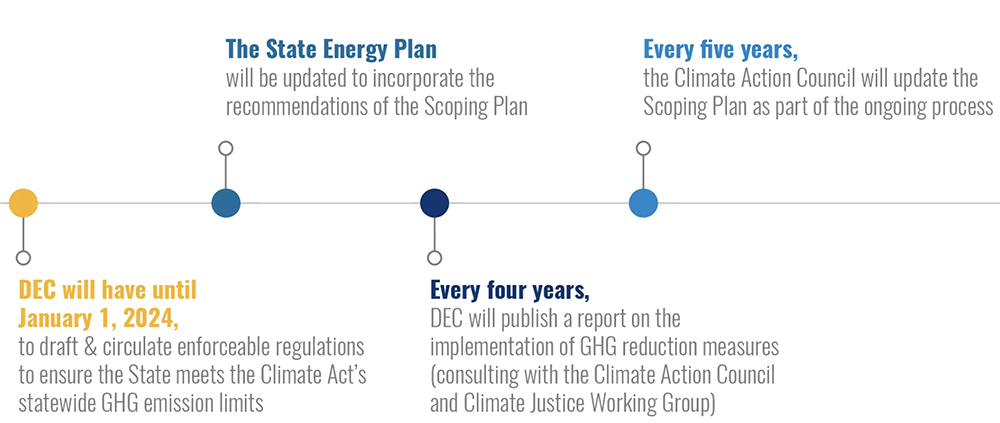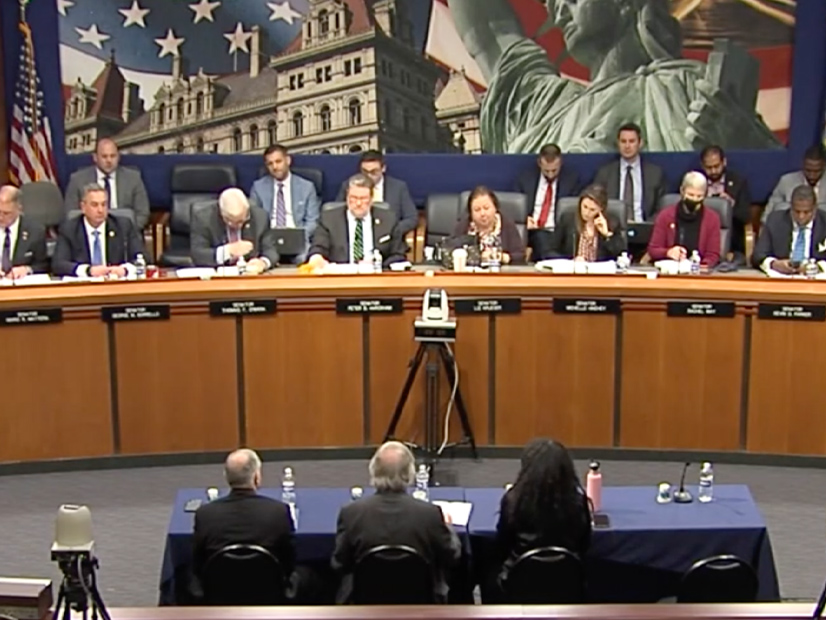Members of the New York Climate Action Council continued their debate over the future of natural gas at a New York Senate hearing last week on legislative and budgetary actions needed to implement the CAC’s final scoping plan.
The scoping plan, approved last month by CAC members, is the framework for reaching the state’s 2050 climate goals. (See Scoping Plan ‘Sets Course’ for NY Climate Goals, Raises Questions.)
More than two dozen witnesses testified at the Jan. 19 joint hearing of the committees on Finance, Energy and Telecommunications, and Environmental Conservation. Sen. Liz Krueger, chair of the Finance Committee, helmed the joint session, saying “this is the most important issue that New York State must get its arms around.”
CAC Member Testimony
CAC members shared their thoughts on protecting ratepayers and revising tax codes in addition to defining the role of natural gas.
Donna L. DeCarolis, president of National Fuel, said mandatory dates that “effectively mandate electrification of homes and businesses without the assurance of identified reliability milestones should be rejected.”
New York “should unlock consumer benefits of alternative fuels, particularly RNG in the near term for immediate emissions reductions and hydrogen in the longer term,” as well as conduct a “quantitative analysis of all costs associated with the various emissions reduction initiatives identified in the scoping plan,” DeCarolis said.
Raya Salter, executive director of Energy Justice Law and Policy Center, told lawmakers “we must, leading with justice and equity, act on climate now, and that means closing the state’s fossil fuel plants and moving away from the combustion of fossil fuels.”
Bob Howarth, a professor at Cornell University, argued New York should restore earlier deadlines from the draft scoping plan and repeal laws that subsidize natural gas utilities.
Gavin J. Donohue, CEO of the Independent Power Producers of New York, cautioned “against legislative action that would increase consumer costs, jeopardize the benefits they are receiving from competitive wholesale electricity markets, and harm the reliability of power supplies.”
Donohue told lawmakers to also heed NYISO’s reliability warnings and conduct a “comprehensive ratepayer cost impact analysis.”
Preserving “existing renewable energy facilities and retaining and expanding other non-emitting facilities” is as important as attracting new resources, he said.
Anne Reynolds, executive director of the Alliance for Clean Energy New York, shared recommendations aligned with the group’s recently released legislative priorities, including tax breaks for renewable developers, policies supporting a cap-and-invest program, and expanding transmission capacity. (See ‘Environmental Expectations,’ 2023 Preview of NY Legislature on Energy and Environment.)
Additional Testimony
Other stakeholders provided suggestions, including passing new decarbonization legislation, adjusting the tax code, and increasing the availability of clean energy development programs.
Brian Schultz, CEO of Central New York Regional Transportation Authority, advised legislators to “allow flexibility to consider renewable natural gas and hydrogen energy sources as alternative means for further decarbonizing” and asked that legislators “avoid overly prescriptive legislation with unfunded mandates and unrealistic timelines.”
The Real Estate Board of New York (REBNY) said policymakers should “prioritize creating a set of achievable, predictable, and efficient standards for the building sector.” Failing to do so, it said, would “add unnecessary compliance costs and make it less likely that the state’s goals are achieved.”

REBNY suggested the legislature “create a tax abatement and incentive program for investments in building greenhouse gas emissions reduction” to encourage greater investment in decarbonizing the building sector.
Consolidated Edison (NYSE:ED) said legislators should allow utilities to own and operate renewable generation assets, and “increase clean heat and energy efficiency programs and allow for accelerated depreciation of gas assets.”
The company also called for property tax changes, saying the current system is regressive and discourages electrification of heating and transportation.
Raziq Seabrook, government relations manager at National Grid (NYSE:NGG), said the utility identified four policies to help with implementing the scoping plan: accelerate electric system modernization; expand energy efficiency programs; decarbonize buildings and industry through innovative clean energy options; and promote energy affordability.
Avrielle Miller, policy coordinator at NY Renews told the committee members they need to pass the Climate, Jobs & Justice Package to ensure “40% of the state’s clean energy benefits go to disadvantaged communities, create unionized jobs, lower utility bills, and protect our air and water.”
Betta Broad, director at the Association for Energy Affordability, testified that implementation would be assisted by passing the New York Home Energy Affordable Transition (HEAT) Act — formerly known as the Gas Transition and Affordable Energy Act — and creating programs that expand clean energy career pathways.
Next Steps
The committees will now break into their respective sessions, using recommendations from the joint session to draft bills that will implement the scoping plan.



